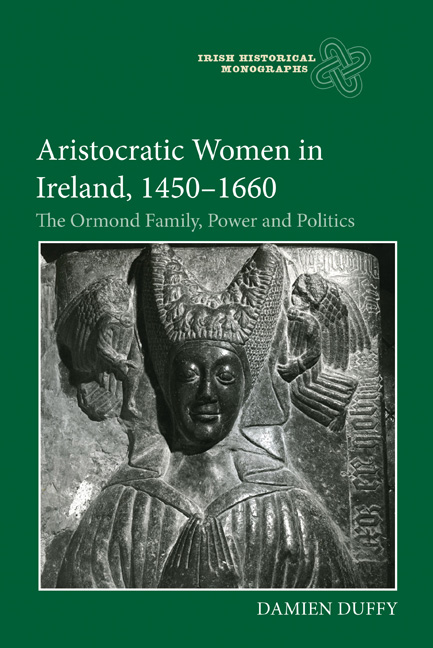Book contents
- Frontmatter
- Dedication
- Contents
- Preface
- Acknowledgements
- List of Abbreviations
- Introduction
- 1 Aristocratic Women’s Lives in Late Medieval and Early Modern Western Europe
- 2 The Ormond Women Through the Wars of the Roses and Immediate Aftermath: Marriage, Absenteeism and Illegitimacy
- 3 New Beginnings: The Heiresses, the Usurper and Royal Intervention – the Succession of Margaret and Anne Butler
- 4 Dynastic Consolidation and Female Political Entity: Margaret Fitzgerald, Countess of Ormond and Ossory (1472–1542)
- 5 Family, Marriage and Politics: The six Daughters of Margaret Fitzgerald and Piers Butler and the Ongoing Revival of the Earldom in the Sixteenth Century
- 6 ‘You have too Piteous a Face to be a Warrior’: Joan Fitzgerald, Countess of Ormond, Ossory and Desmond – Agent, Peace Broker, Advocate
- 7 Black Tom’s Women: Unions, Succession and Decline
- Conclusion
- Bibliography
- Index
- Irish Historical Monographs Previous Volumes
2 - The Ormond Women Through the Wars of the Roses and Immediate Aftermath: Marriage, Absenteeism and Illegitimacy
Published online by Cambridge University Press: 26 March 2021
- Frontmatter
- Dedication
- Contents
- Preface
- Acknowledgements
- List of Abbreviations
- Introduction
- 1 Aristocratic Women’s Lives in Late Medieval and Early Modern Western Europe
- 2 The Ormond Women Through the Wars of the Roses and Immediate Aftermath: Marriage, Absenteeism and Illegitimacy
- 3 New Beginnings: The Heiresses, the Usurper and Royal Intervention – the Succession of Margaret and Anne Butler
- 4 Dynastic Consolidation and Female Political Entity: Margaret Fitzgerald, Countess of Ormond and Ossory (1472–1542)
- 5 Family, Marriage and Politics: The six Daughters of Margaret Fitzgerald and Piers Butler and the Ongoing Revival of the Earldom in the Sixteenth Century
- 6 ‘You have too Piteous a Face to be a Warrior’: Joan Fitzgerald, Countess of Ormond, Ossory and Desmond – Agent, Peace Broker, Advocate
- 7 Black Tom’s Women: Unions, Succession and Decline
- Conclusion
- Bibliography
- Index
- Irish Historical Monographs Previous Volumes
Summary
The history of the Wars of the Roses has usually been told in terms of the men who alone could take part in its physical conflicts, but the lives of the women behind them could be affected no less profoundly.
The Wars of the Roses, the protracted contest over which of King Edward III's descendants had the strongest claim to the crown of England, was fought between brothers, sons and cousins, the main protagonists being the Lancastrians and the Yorkists, both descended from the Plantagenet line of Edward III. The conflict erupted following King Henry V's death in 1422, when his son and heir, the future King Henry VI, was only nine months old. During the ensuing political vacuum in the 1420s and ‘30s, several members of Henry's extended family emerged as potential rival claimants to the throne. At the beginning of the 1450s, by which time Henry VI was in his early thirties and married, the Lancastrians had been on the throne for over fifty years and three generations, from Henry IV's accession in 1399. However, Henry VI's manifest unsuitability for the role caused feuding among rival claimants which flared up into military conflict in 1455. On the Yorkist side, Richard of York was the strongest potential claimant. His wife, Cecily Neville, emerged as the matriarch of the house of York. On the Lancastrian side, Margaret Beaufort would become mother to another rival claimant, Henry Tudor. The in-fighting which continued throughout the middle decades of the fifteenth century divided the landed aristocracy and profoundly impacted entire families in both England and Ireland as alliances shifted on an ongoing basis. For the Butlers of Ormond, the period from the outbreak of the Wars of the Roses until the death in London of Thomas Butler, seventh earl of Ormond, in August 1515, was a transformative phase in the history of the dynasty, largely owing to decades of absenteeism from Ireland by successive earls.
So what of the lives of the Ormond women during this protracted conflict in England and the impact it had in the short and medium term on the dynasty from the 1450s until 1515?
- Type
- Chapter
- Information
- Aristocratic Women in Ireland, 1450-1660The Ormond Family, Power and Politics, pp. 21 - 52Publisher: Boydell & BrewerPrint publication year: 2021

